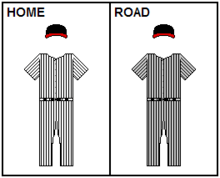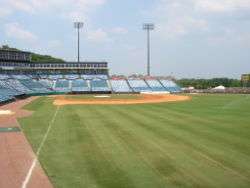Nashville Xpress
|
Nashville Xpress 1993–1994 Nashville, Tennessee | |||||
| |||||
| Class-level | |||||
|---|---|---|---|---|---|
| Previous | Double-A (1993–1994) | ||||
| Minor league affiliations | |||||
Previous leagues | Southern League (1993–1994) | ||||
| Major league affiliations | |||||
| Previous | Minnesota Twins (1993–1994) | ||||
| Minor league titles | |||||
| League titles (0) | none | ||||
| First half titles (1) | 1993 | ||||
| Team data | |||||
| Nickname | Nashville Xpress (1993–1994) | ||||
| Colors |
Red and black | ||||
| Ballpark | Herschel Greer Stadium (1993–1994) | ||||
The Nashville Xpress were a Minor League Baseball team of the Southern League from 1993 to 1994. They were located in Nashville, Tennessee, and played their home games at Herschel Greer Stadium, which opened in 1978. They were the Double-A affiliate of the Minnesota Twins and were named in reference to trains which ran along tracks beyond the ballpark's outfield wall. The Xpress shared their ballpark with the Triple-A American Association's Nashville Sounds.
Previously known as the Charlotte Knights of Charlotte, North Carolina, the Southern League franchise was left without a home when Charlotte moved up to become a Triple-A franchise as a part of the 1993 Major League Baseball expansion. After spending two years in Nashville, the team relocated to Wilmington, North Carolina, becoming the Port City Roosters in 1995.
Team history
1993 season
In conjunction with the 1993 Major League Baseball expansion, the Double-A Charlotte Knights of the Southern League were selected to move up to Triple-A as an International League franchise.[1] This left George Shinn's Southern League team with out a home. Shinn planned to sell his Double-A franchise to Tom Benson who planned on moving the team to New Orleans, Louisiana.[2] However, the sale was cancelled when John Dikeou, owner of the Triple-A American Association's Denver Zephyrs, moved his team there after being displaced by the Colorado Rockies National League expansion team.[2][3]
Southern League president Jimmy Bragen approached Larry Schmittou about placing the team at Ernie Shore Field in Winston-Salem, North Carolina, home of Schmittou's Class A-Advanced Winston-Salem Spirits of the Carolina League. The facility would have been inadequate for a Double-A team, so Schmittou offered Herschel Greer Stadium in Nashville, Tennessee, as a temporary home for the team.[1] Greer was home to Schmittou's Triple-A Nashville Sounds of the American Association. In January 1993, Southern League team owners met to explore all options for the homeless franchise. In the end, they decided to accept Schmittou's offer and place the team in Nashville for one season. A one-year management arrangement was decided upon wherein Schmittou and the Sounds' staff would be responsible for taking care of Shinn's team.[2] This marked the first time that two minor league teams would operate in the same city since 1972, when the Charlotte Hornets and Charlotte Twins shared Calvin Griffith Park.[3][4]
The Nashville team was named the Xpress in reference to freight trains which traversed the railroad tracks located to the east-southeast of Greer Stadium just beyond the outfield wall.[5] The Xpress' home games were scheduled for during the Sounds' road trips, and the team went on the road when the Sounds played at home.[6] They played in the Southern League as the Double-A affiliate of the Minnesota Twins and were managed by former major league catcher Phil Roof.[7] The coaching staff was rounded out with pitching coach Rick Anderson and hitting coach Mark Funderburk, both former Twins players.[8]
The Xpress completed the first half of the season with a 40–31 record and won the first-half western division title. They finished the second half in fifth (last) place with a 32–39 record, suffering from late-season player promotions.[3] The 1993 Xpress had a season record of 72–70.[7] The Xpress faced the Birmingham Barons, the second-half western division winners, in the best-of-five division championship series. The Barons swept the Xpress in three straight games, eliminating Nashville from the postseason, the only postseason appearance in franchise history.[8]
Nashville's Oscar Muñoz won the Southern League Most Outstanding Pitcher Award.[9] Outfielder Rich Becker was selected for the postseason All-Star team.[10] Marty Cordova tied for the league lead in extra-base hits (54), and Jeff Mansur tied for the lead in complete games (4).[8]
By the end of the season, Dennis Basteen had come to terms to purchase and relocate the Xpress to Lexington, Kentucky, but he was unable to get a new ballpark built in that city. He asked Schmittou to keep the team in Nashville for one more year.[1]
1994 season
Phil Roof and his coaching staff returned in 1994 for the franchise's second and final season. Despite finishing the year with a 74–66 record,[11] the Xpress failed to win either half of the season and were left out of the postseason picture.[8]
The Xpress led the Southern League in earned run average (3.40).[8] Right-handed pitcher Brad Radke was named to the post-season All-Star team.[10] Radke and fellow starter Marc Barcelo tied with each other and one other player for the lead in games started with 28.[8] Right-hander LaTroy Hawkins tied for the best winning percentage (.818, 9–2).[8]
After the failed attempt to relocate the team to Lexington, and even Bayamón, Puerto Rico, the Xpress left for Wilmington, North Carolina, after the season, becoming the Port City Roosters in 1995.[12] They remained there for two seasons, before again relocating to Mobile, Alabama, and continuing play as the Mobile BayBears in 1997.[8]
Season-by-season results
| Year | Regular Season | Postseason | ||||||
|---|---|---|---|---|---|---|---|---|
| Record | Win % | League | Division | GB | Record | Win % | Result | |
| 1993 | 72–70 | .507 | 5th | 3rd | 6 | 0–3 | .000 | Won first-half Western Division title Lost Western Division title vs Birmingham Barons, 3–0 |
| 1994 | 74–66 | .529 | 4th (tie) | 3rd | 8 | — | — | — |
| Totals | 146–136 | .518 | — | — | — | 0–3 | .000 | 0 SL Championships |
Ballpark
The Xpress shared Herschel Greer Stadium with the Nashville Sounds. The ballpark, now vacated but still standing, is located on the grounds of Fort Negley, an American Civil War fortification approximately two miles (3 km) south of downtown Nashville. The venue experienced numerous renovations after its completion in 1978,[13] but seated approximately 18,000 spectators during the Xpress' occupancy.[14] Its best known feature is the giant 115.6 foot (35.2 m) guitar-shaped scoreboard which was installed in 1993 behind the left field wall.
Uniforms

Nashville's home and road uniforms were similar to those of their major league parent, the Minnesota Twins. Home jerseys were white with black pinstripes. "Xpress" was written across the chest in red letters with a black outline. The player's number was displayed on the back in red characters surrounded by black. In 1994, a patch of the team's primary logo was added to the left sleeve. Pants were white with black pinstripes and were paired with black belts. Road uniforms were the same, except they were made of gray material. Both uniforms were worn with a black cap with a red brim and button with a white steam locomotive coming out from underneath a red "N" with a white border, as if serving as a tunnel.
Notable players
Of the 60 players who played for the Xpress during the team's existence, 22 also played at least one game in the major leagues.[7][11] These players were:
References
- Specific
- 1 2 3 Woody 1996, p. 104.
- 1 2 3 Nashville... One City—Two Teams. The Nashville Sounds 1993 Official Souvenir Program. Nashville Sounds. 1993. p. 102.
- 1 2 3 O'Neal 1994, p. 187–190.
- ↑ O'Neal 1994, p. 224.
- ↑ Woody 1996, p. 103.
- ↑ Weiss, Bill; Wright, Marshall (2001). "69. 1980 Nashville Sounds". Minor League Baseball. Retrieved May 9, 2017.
- 1 2 3 "1993 Nashville Xpress Statistics". Baseball-Reference.com. Sports Reference LLC. Retrieved May 30, 2017.
- 1 2 3 4 5 6 7 8 "Nashville Xpress Team History (1993–1994)" (PDF). 2015 Nashville Sounds Media Guide. Nashville Sounds. 2015. pp. 196–198. Archived from the original on April 7, 2015.
- ↑ "Southern League Award Winners". Southern League. Minor League Baseball. Retrieved May 30, 2017.
- 1 2 "Postseason All-Star Teams". Southern League. Minor League Baseball. Retrieved May 30, 2017.
- 1 2 "1994 Nashville Xpress Statistics". Baseball-Reference.com. Sports Reference LLC. Retrieved May 30, 2017.
- ↑ Woody 1996, p. 105.
- ↑ Ryan, Abner (August 17, 2010). "Nashville's loss could be RedHawks' gain". NewsOK. Retrieved May 27, 2017.
- ↑ O'Neal 1994, p. 283.
- General

